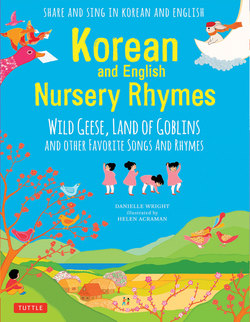Читать книгу Korean and English Nursery Rhymes - Danielle Wright - Страница 3
На сайте Литреса книга снята с продажи.
ОглавлениеPronunciation Guide
In Korean:
Some of the sounds in the Korean language are like English sounds, but there are some differences that are important to remember.
a always sounds like it does in the word “father.”
ae together make a sound that combines “ah” and “ee” to make a sound that that is a little like the “a” sound in “make.”
e always sounds like it does in the word “bend.”
eo together make a sort of “uh” sound like in the word “mother.”
eu together make a sound that rhymes with “book.”
eui together make a sound that rhymes with “gooey.”
i always makes an “ee” sound, like in the word “piece.”
o always sounds like it doe s in the word “post.”
oe together make a sort of “oi” sound, a little like in the word “point.”
u always sounds like it does in the word “blue.”
we always sounds a little like in the word “way,” and also a little like in the word “wet.”
wi sounds like the word “we.”
yeo sounds makes a “yuh” sound, like in the word “yuck.”
Most of the consonants sound like they do in English.
A single b sometimes has a soft p sound, but bb has a hard b sound.
A single d sometimes has a soft t sound, but dd has a hard d sound.
A single g sometimes has a soft k sound, but gg has a hard g sound, like the word “goat.”
A single j sometimes has a soft ch sound, but jj has a hard j sound.
r and l sound sort of alike. If you curl your tongue against the roof of your mouth and try to make the l or r sound, you will hear the sort of sound these letters make in Korean.
kk sounds a little harder than a single k does.
si is pronounced “she.”
ss sounds a little harder than a single s sound. In some of the syllables in these rhymes, the ss has more of a t silent.
tt sounds a little harder than a single t sound.
